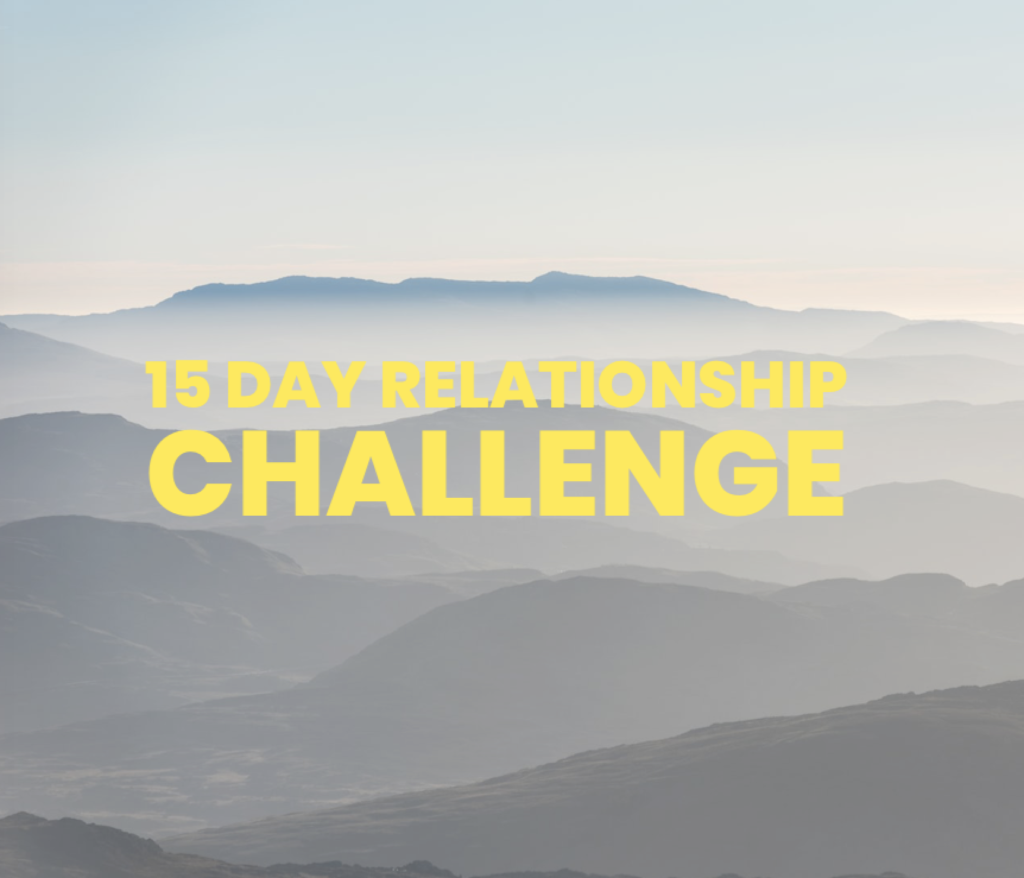This post is a part of The 15-Day Relationship Challenge. If you’re just now tuning in, click here for the whole series.
MORNING
Forgiveness. Letting go, holding on.
Good morning. Welcome to Day 13.
Imagine dangling from a cliff, you’ve just slipped and caught a tree branch growing from the mountainside with your right hand. Your spouse is above you reaching their hand down to grab your left hand. It’s your only hope to be saved from falling. What do you do with your right hand, the one holding onto the branch? Nothing. You keep it securely gripped to the tree so that your left hand is free to grab ahold of their outstretched hand.
Forgiveness is the hand that is offered to us as we dangle over the cliff. Without it, we will fall into the abyss below. Unknown if we will able to return to the relationship we just lost.
What I know about forgiveness is that it has a profound cost. Forgiveness that does not include a cost probably isn’t forgiveness, but a platitude. Just think of the cliff metaphor. Forgiveness is costly to the one receiving it. They have to trust their life to someone above with better footing. In order to be saved, they have to let go of the tree branch (which might feel more strong and true at the time).
For the one offering forgiveness, the hand, they have to give up their safe perch on the path above. They have to give up their safety, and risk falling into the abyss below.
Yesterday, you wrote a letter of responsibility that gave specific details about how your actions hurt your spouse. This letter’s natural progression is towards asking for, and granting forgiveness. You were asked to refrain from that for a very intentional reason: We usually do not consider the cost associated with granting and receiving forgiveness. Taking an extra day to consider what it would mean to forgive and be forgiven keeps you both honest to not escaping from the difficulty of the conflict.
If you do not sit down and look at the abyss below and how one or both of you flirted with falling into it, you’ll be escaping from the conflict, not resolving it. Sit down and process what hurt, the fears it caused, the damage the actions caused or might have caused, and then forgive. Don’t forgive until you know specifically what you are forgiving. Good intentions don’t mean anything when hurts take place. That’s like saying “I wasn’t trying to fall off the cliff, I just happened to slip and there I was.” Truth be told, if you weren’t so flirty with the edge, an accidental slip wouldn’t have been so threatening.
The Lords prayer says, “forgive us our trespasses as we forgive those who trespass against us.” It’s a combo deal. If we have been forgiven, it is on us to forgive. When we forgive others, there are needs we have that will help keep us safe from similar issues arising in the future. Name those needs. In our cliffhanger story, the one who rescues the fallen one will likely need them to stay pretty far away from the cliffside in the future … even if that’s the place that makes them come alive inside.
Lastly, forgiveness is a lifestyle, not an event. Don’t forgive and move on. Remember it. Keep practicing it. Stay with the healing force of it. We must steward the gift of forgiveness, both in our receiving and in our giving of it.
Reflection Questions
- What did I think about my spouse in reading today’s material? Was it kind? Was it thoughtful? Was it loving?
- Did I have feelings, thoughts, questions, or stories that came to mind?
- What is something I can do for them today?
- How can I welcome and receive what they have done for me today?
Assignment
Part 1: In your life story, where have you experienced the most significant act forgiveness? What is that story?
Part 2: Think back to what was shared with you in the letter last night and answer these questions: What are the specific actions that you need to offer a hand of forgiveness? What are you needs about what you are forgiving? How can you make this act of forgiveness a lifestyle?
EVENING
Hello! Welcome back. Great to see you again. How was your day?
Forgiveness is action that will free both you and your spouse from the chains of resentment. You cannot hold on to resentments if you give or receive forgiveness. This is why forgiveness involves letting go, and holding on. We let go of our individual safety, and hold on to our safety together.
Take 10-15 minutes tonight with your spouse to talk through your day.
- What were the highs and lows?
- Where were you surprised?
- Was there anything different about your day because of the assignment(s)?
- From this mornings reading, what stood out to you?
- If you’re willing, share your answers to the assignment.
Assignment Connection
If you’re ready and able, ask or offer forgiveness to your spouse from what was said in the letter from yesterday. Also ask “how can I make this right?”
______________________________________

